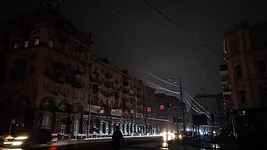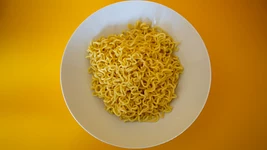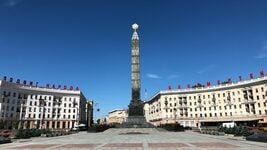"I cleaned IT offices in the evenings." A conversation with scientists from the National Academy of Sciences of Belarus
They say it’s a place where «serfdom» still hasn’t been abolished.
They say it’s a place where «serfdom» still hasn’t been abolished.

They say it’s a place where «serfdom» still hasn’t been abolished.
— I joined the National Academy of Sciences (NAS) about ten years ago through a connection. Before that, I was doing the same work that was planned for this position. I already had experience working at a research institution: I worked as a junior researcher at a research center for four years. At NAS, I was hired for the same position.
For the first two or three years, I focused exclusively on my technical tasks. Occasionally, my supervisor would suggest publishing an article, since our department employed only research staff whose main output should be publications. I wasn’t against it, but there was no scientific novelty in my work—essentially, all my daily processes were borrowed from similar European institutes.
The salary at NAS was small—just above the minimum wage—but I was willing to endure it to work with the unique materials I had access to, which gave me satisfaction every day. I didn’t understand how our institution functioned, and frankly, it seemed secondary to me.
I was once a graduate student at a Belarusian university but was asked to withdraw. At my new workplace, I occasionally thought about enrolling in graduate school again. In 2020, I had the opportunity to work with a well-known researcher who suggested a research topic, prompting me to re-enter graduate studies.
At one event, I personally saw the then-chairman of NAS for the first time and the head of the humanities department—I experienced terrible disappointment because I had thought we were led by professional corrupt officials, but after hearing their speeches, I realized they were, if not fools, then completely incompetent.
Full-time graduate studies allowed me to work part-time. The graduate stipend plus half the salary of a junior researcher meant a significant increase in income, making me feel less depressed. Later, I was included in a project that provided additional payments—bringing my earnings to about 2,000 rubles overall.
But in March 2025, the projects ended—along with the additional payments. Since then, I’ve been receiving 1,025 rubles. We had a PhD in art history who transferred to another department—she earned 1,250.
In April-May, I moonlighted as a cleaner in the evenings, cleaning IT company offices (only work areas, not bathrooms) 5 days a week from 7pm to 11pm—earning an additional 700 rubles per month. As you can see, a cleaner’s salary is higher than that of a PhD.
In general, it’s not difficult to find an unskilled job in Minsk with a salary starting at 1,500 rubles.
Now I occasionally pick up warehouse work—unloading trucks or labeling products. Because living on a thousand rubles isn’t easy.
Since I work with archival materials, I’ve always wanted to organize a proper repository. I repeatedly approached the deputy director with this proposal—he liked the idea but each time responded that «there are no available spaces.» Meanwhile, in the last 5 years, three deputies and a secretary received individual offices—somehow, four rooms were found for them.
We often have renovations: floor polishing, window and door replacements—but buying decent computers, printers, and other equipment is a major problem. Last year or the year before, one deputy who joined us after 2020 and has already left purchased 20 personal computers, each costing 400 rubles. It was wasted money—it would have been better to buy two computers for 4,000 rubles each, at least then we would have gotten some use out of the equipment.
A few years ago, a new 70-year-old employee joined us for a quarter-time lab assistant position—and quite quickly acquired a new decent computer, multifunction printer, large-format printer, and much more. Meanwhile, for three consecutive years, I had been asking the deputy director to replace my 10-year-old computer with non-functioning USB ports. The new assistant quickly secured a separate renovated office—all because he was a friend of the director.
During the coronavirus period, hand sanitizer appeared in the bathrooms, and later, after six months to a year, they started providing soap. Toilet paper only appears on tables or toilet tanks during international scientific conferences or other ceremonial events.
The plumbing is in mediocre condition. After 2020, we had two floods. After the first serious one (on a weekend; apparently no one responded, allowing water to spread from the sixth floor down to the ground floor where the security guard was stationed), the doors to the floors were deformed, but they still haven’t been replaced—yet somehow they managed to replace the attic exit doors at the end of the building.
In June, I saw a job vacancy with a salary of 3,000 to 6,000 rubles for an unskilled laborer at a handmade brick production facility. I seriously considered whether I should quit the NAS, start earning a decent living? I also recently read news that in Gomel, so-called «parasites» are almost being forced by the state to learn in-demand professions—drivers, welders, and so on—and I thought it would be good to offer this to NAS employees. Probably many would agree to obtain truck or bus driver’s licenses at state expense and even work behind the wheel for five years.
You can say a hundred times: «Yan, defend your thesis, we lack personnel, we need PhDs,» but when you receive your salary, you immediately lose any doubts about your value in the market.
— In 2023, after completing my master’s degree, I was assigned to one of the National Academy of Sciences institutes. At university, we were inspired to pursue science, and I thought I would, like Prometheus, bring the fire of knowledge to the people. In a way, that’s what happened: I ended up in chains and forced to suffer every day.
For a young specialist, the NAS of Belarus is a kind of «serfdom.» Young people are placed there under mandatory job assignments, but no one explains the real situation. What awaits them is a system dominated by an older generation living by Soviet-era rules. Any attempt to think differently or propose changes meets their fierce resistance.
Good, intelligent, and dedicated people work here, but they all seem stuck in this situation, becoming hostages to their own and others' illusions. I’m valued here and people try to support me, for which I’m immensely grateful to those who stood by me. However, the overall atmosphere deprives one of the opportunity to truly develop in science, move forward, and realize one’s potential.
When I was hired, I saw an amount of about 580 rubles in the full-time contract—it simply shocked me.
Almost immediately, I was given an ultimatum: since I came to work at the NAS of Belarus, I had to enroll in graduate school—this wasn’t even up for discussion. There was practically no competition—everyone who applied was accepted.
Despite all the difficulties, I learned a lot there—I write scientific publications, know how to properly structure research methods, and work with large volumes of data.
I still have one year of study left. Currently, my income consists of a stipend—1,100 rubles—and part-time salary at the same Academy of Sciences—about 400 rubles, totaling around 1,500 rubles. But I understand that after completing my studies, my income will sharply decrease again.
Many think that defending a dissertation guarantees success. But in our system, it doesn’t work that way. Chances for successful and timely defense often depend not so much on the scientific value of the work as on your loyalty and necessary connections. Without patronage, you can stand in «line» for years.
You might wonder how people who work there survive on a salary of 800 rubles. The secret is simple: many employees have already reached retirement age, they receive decent pensions, and working at the Academy is, as they say, «for the soul,» to avoid getting bored at home. In total, they often earn a respectable income.
Another example is middle-aged scientists. They participate in well-funded projects and programs, allowing them to earn several thousand rubles. But to get into such a project, you need to be «one of them» and prove years of loyalty to the system. In summer, at a meeting, we were told the average salary at the institute was 2,500 rubles. Looking at my payslip, I could only wonder where such figures came from.
In the academic environment, it’s not uncommon for young scientists’ materials and developments to be published under other people’s names, sometimes without even mentioning the real author among the co-authors. It also happens that dissertations are written by some people, but defended by completely different ones.
My plan is to leave this «swamp,» however crude that sounds. I understand that if I quit, they most likely wouldn’t let me defend my dissertation, and I’ve already come to terms with this fact. So I’ve started IT courses and will soon be looking for a new job.
It saddens me to see how science in Belarus is gradually fading away along with the generation that once created it.
— I came to the Academy of Sciences in 2007 and stayed there for a long time. I still maintain relationships with former graduate and master’s students.
I was a junior researcher, and my salary was so small (about $200-250 take-home) that I had to work part-time elsewhere at night, plus I tutored.
When my supervisor at my main job found out I was moonlighting elsewhere—she cut my salary to match other junior staff. Money was again insufficient, and fatigue accumulated. I approached her to discuss raising my salary—asked what I could do for that. She replied that I should quit my side job and take work home, as she does, and that «in science, people work for the idea, not for money, and if you need money—quit and go work in IT.»
By the way, I remember one of our employees who distinguished himself and received a presidential scholarship—they stopped paying him bonuses, arguing it was to equalize his salary with other employees who didn’t receive such an allowance.
But it’s worth saying that they don’t economize on retirees' salaries at the Academy of Sciences—and find various opportunities for additional bonuses, up to annual certificates of appreciation for work in the current year.
Science has always interested me, but Belarusian science—not particularly. I thought I’d get a degree and move on to build a career, but somehow unwittingly got stuck in this swamp for 10 years.
Yes, I met many happy, ambitious young people here who for their own reasons decided to stay in the country—and in Belarusian science, which after the 90s was left without quality equipment or basic conditions (the furniture we used fell apart, reagents dated from the 60s-80s, in winter we worked in our coats). We supported each other, shared experiences and knowledge—after all, we have our lives ahead of us; who knows where we’ll end up.
But otherwise, the reality wasn’t encouraging: the tone at the Academy of Sciences was set by people with over 30 years of experience, who insisted that «nothing comes for free» and «if you want to live well, you should go into business, not science.» Yet they themselves found ways to earn money in science too.
Here’s a standard practice at the Academy of Sciences: there’s a so-called distinguished scientist who has been studying dust settling rates on various surfaces for over 20 years. He needs to get money again, but since his theoretical work isn’t needed by anyone, and after 20 years his creativity for disguising the topic has dried up (transforming «Carrying Water in a Sieve» into «Analysis of Problems in Transporting Substances in a Liquid Aggregate State in Vessels with Perforated Bottoms»)—what can he do? Take on more master’s and doctoral students. Since he’ll have many young researchers, he can submit several projects at once, and the request will be approved almost without problems, because it’s so difficult to do scientific research without funding at the beginning of one’s career. And in such a case, there are fewer objections to similar project themes (he’ll supposedly be transferring experience, creating a scientific school).
In reality, the distinguished scientist will be listed as the leader of all projects, and he’ll manage all the funding himself: if he wants—he’ll give someone a bonus, if he doesn’t want to—he won’t; if he wants—he’ll approve the purchase of necessary equipment or materials, if he doesn’t want to—he won’t.
At the end of the project, unspent money will transfer to the salary fund and be distributed by him as bonuses. And yes, this is where the phrase comes in handy: «In science, people have always worked only for the idea; money is earned in business, so leave—we’re not keeping anyone, and others will take your place, because graduates have mandatory job assignments that need to be served somewhere.»
* The speakers’ names have been changed at their request.



